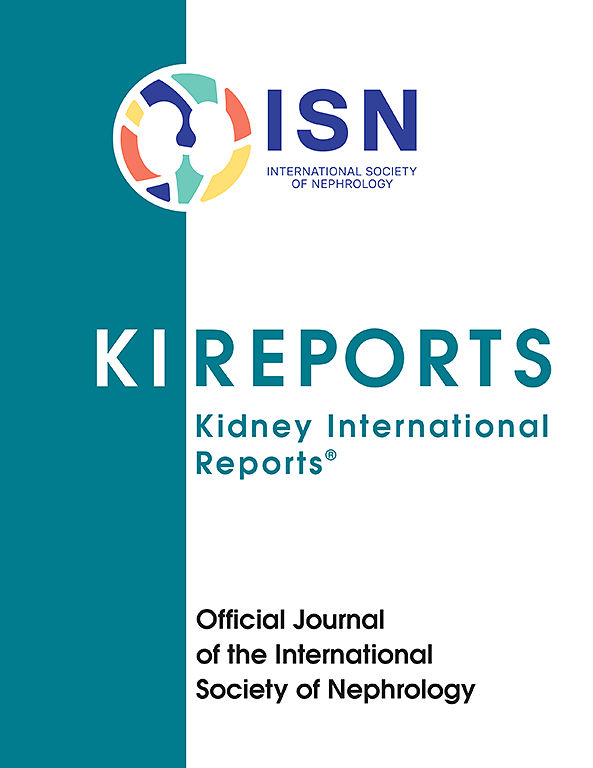Patient and Health Care Provider Perspectives of Cognitive Difficulties in Dialysis
IF 5.7
2区 医学
Q1 UROLOGY & NEPHROLOGY
引用次数: 0
Abstract
Introduction
Cognitive impairments (CIs) are common among patients on dialysis, compromising functional capacity, decision-making, and quality of life. Previous work is dominated by quantitative studies, leaving the everyday experience of these impairments and their practical implications poorly understood. This qualitative study explored patients’ and providers’ perspectives on the lived experience of cognitive difficulties, impacts on daily living and care delivery, and associated needs.
Methods
Semistructured interviews and focus groups were conducted with 29 patients on hemodialysis (HD) and 27 renal health care providers (HCPs), including nephrologists, renal nurses, and allied health professionals. Interview transcripts were analyzed using reflexive thematic analysis.
Results
The following 6 themes emerged: (i) manifestation of cognitive difficulties, (ii) perceived risk factors, (iii) impacts, (iv) attitudes toward cognitive difficulties, (v) strategies to manage cognitive difficulties, and (vi) unmet needs. Participants acknowledged dialysis patients’ CIs across multiple domains that compromised independence, increased caregiving burden, and interfered with routine care. HCPs highlighted health and safety risks associated with CIs, whereas patients viewed these impairments with varied attitudes, including normalization and denial. Patients and providers employed diverse strategies to manage cognitive difficulties, and identified a need for societal awareness, social support, and guidelines and tools to assess and manage cognitive difficulties.
Conclusion
CIs is a major issue in renal care that affects the well-being of patients and their families and complicates care provision. This study identified modifiable barriers at the individual and systemic levels to the identification and management of CIs in renal settings, suggesting potential targets for intervention.
透析患者和卫生保健提供者认知困难的观点
认知障碍(ci)在透析患者中很常见,影响功能能力、决策和生活质量。以前的工作以定量研究为主,对这些损伤的日常经验及其实际意义知之甚少。本定性研究探讨了患者和提供者对认知困难的生活经历、对日常生活和护理交付的影响以及相关需求的看法。方法采用半结构化访谈法和焦点小组访谈法,对29例血液透析患者和27名肾科医师、肾科护士及相关医护人员进行访谈。访谈记录使用反身性主题分析进行分析。结果总结出以下6个主题:(i)认知困难的表现,(ii)认知风险因素,(iii)影响,(iv)对认知困难的态度,(v)管理认知困难的策略,以及(vi)未满足的需求。参与者承认透析患者的ci跨越多个领域,损害了独立性,增加了护理负担,并干扰了常规护理。医护人员强调了与CIs相关的健康和安全风险,而患者对这些损害的态度各不相同,包括正常化和否认。患者和提供者采用不同的策略来管理认知困难,并确定需要社会意识,社会支持以及评估和管理认知困难的指南和工具。结论ci是肾脏护理中的一个主要问题,影响患者及其家属的健康,并使护理复杂化。本研究在个体和系统层面确定了识别和管理肾脏环境CIs的可改变障碍,提出了干预的潜在目标。
本文章由计算机程序翻译,如有差异,请以英文原文为准。
求助全文
约1分钟内获得全文
求助全文
来源期刊

Kidney International Reports
Medicine-Nephrology
CiteScore
7.70
自引率
3.30%
发文量
1578
审稿时长
8 weeks
期刊介绍:
Kidney International Reports, an official journal of the International Society of Nephrology, is a peer-reviewed, open access journal devoted to the publication of leading research and developments related to kidney disease. With the primary aim of contributing to improved care of patients with kidney disease, the journal will publish original clinical and select translational articles and educational content related to the pathogenesis, evaluation and management of acute and chronic kidney disease, end stage renal disease (including transplantation), acid-base, fluid and electrolyte disturbances and hypertension. Of particular interest are submissions related to clinical trials, epidemiology, systematic reviews (including meta-analyses) and outcomes research. The journal will also provide a platform for wider dissemination of national and regional guidelines as well as consensus meeting reports.
 求助内容:
求助内容: 应助结果提醒方式:
应助结果提醒方式:


